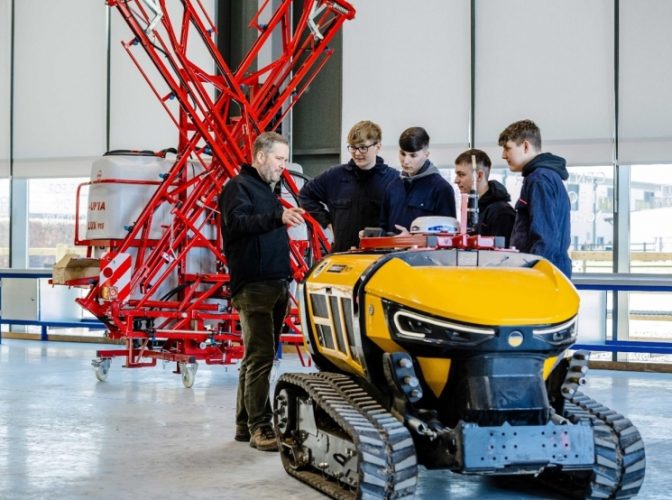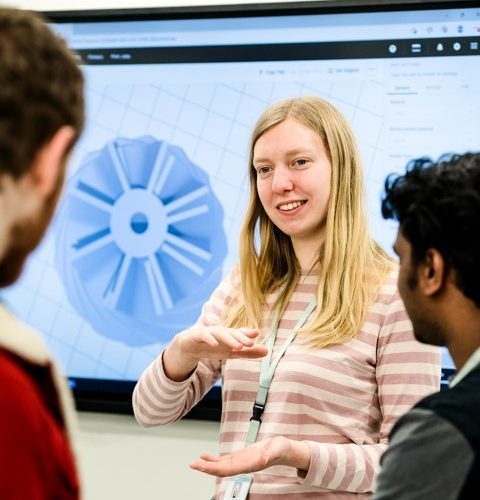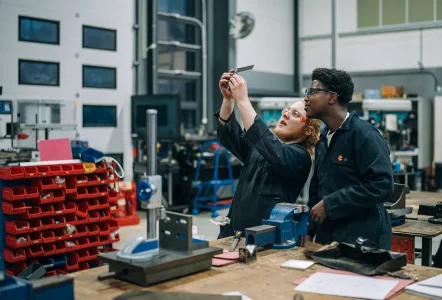Strong links between education and industry are essential for a high-quality technical education system and a thriving economy. Our work helps to facilitate this – be that through connecting young people to new sectors, helping businesses upskill, or supporting university research partnerships.

Technical skills for a thriving economy
Technicians have the technical skills that help drive the UK economy. Stronger links between education and industry are essential to ensure the UK develops the technical skills it needs in a fast-changing world. When learners understand technical career pathways – and employers can shape, support and benefit from the education system – everyone gains.
Gatsby’s work in this space is wide-ranging. We help employers to navigate the many ways they can engage with education – from connecting with their future workforce to upskilling current employees. We foster partnerships between academic researchers and industry innovators and we support the process for industry professionals being able to teach in Further Education. We often work behind the scenes, developing tools, guidance and evidence that help others in the sector to achieve greater impact.

National standards for technical occupations
A world-class technical education system will provide different solutions based on the needs of the individual learners and employers, but at its heart there is a national framework of standards. These standards – recognised by employers as being relevant, rigorous and reliable – should underpin all technical education and training. Supporting the implementation of this process is a core part of Gatsby’s work – by helping to make the system clearer and more accessible for individuals and employers.
How Gatsby is connecting education with industry
Many industry professionals are keen to share their expertise through teaching but can often find the route into Further Education (FE) daunting. Gatsby is exploring training for Industry Associates, who contribute to teaching alongside their industry roles. Industry Associates contribute in a range of ways, including delivering masterclasses or short teaching topics and advising on curriculum content. This model builds confidence for Industry Associates, who may in future progress into teaching roles.
We work to keep employers at the heart of technical education – ensuring the system is responsive to industry needs, locally coordinated and designed to equip learners with the skills required for the modern economy.
High-quality technical education relies on access to expert staff and industry-standard facilities, which can be difficult to sustain locally – especially for specialist training. Gatsby supports strategic, area-wide planning to align provision with labour market demand, reduce duplication and gaps between providers, and encourage appropriate specialisation. Since 2013, we have worked with local areas to address these challenges, most recently commissioning work to support employer representative bodies as they develop Local Skills Improvement Plans that help FE providers identify local skills needs and align provision to meet this.
Industry placements are a core element of T-levels, providing students with around 45 days of structured, real-world experience to help build occupational skills and workplace confidence.
Gatsby has supported the development of this model from the outset. Before T-levels were introduced, we worked with FE leaders to explore successful international placement systems. We also commission UK-based research to understand how placements can support learning in sectors including construction, childcare, engineering and health.
Our work continues to support the effective delivery of placements, ensuring they are valuable for students, practical for providers and beneficial for employers.
Gatsby, with support from a strategic advisory group made up of the British Chambers of Commerce, CBI, FSB, IoD, the Careers & Enterprise Company and the Department for Education, developed The Education Landscape Guide and Index. These resources describe the education and skills system in England, offering a clear starting point for businesses new to the space. They outline the many ways employers can get involved, along with the benefits of doing so, helping to bridge the gap between business and education.
We fund the Sainsbury Management Fellows Scholarship to support talented young engineers and scientists with leadership potential in pursuing full-time MBAs at top international business schools.
The programme equips them with the commercial and strategic skills needed to drive innovation, lead businesses and contribute to the UK’s economic growth. Each Fellow receives up to £50,000 towards their studies.
Institutes of Technology (IoTs) are reshaping technical education in England by placing employers at the centre of design and delivery. These innovative partnerships between industry, Further Education colleges and universities offer advanced, high-quality training aligned with real workforce needs.
Further Education colleges are well positioned to support local employers by applying their technical expertise and management capabilities to foster innovation and help businesses develop and scale their products and services.


